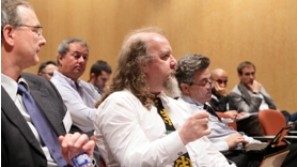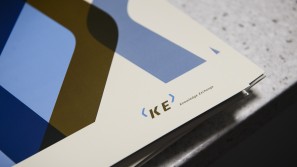An open exchange at strategic planning level might help realise more of Knowledge Exchange's strategic aims. Aside from IT infrastructure in general, priority areas where Knowledge Exchange has an interest in exchanging views with the European Commission are: Research Data, Open Access and a context for international sustainable business models.
Knowledge Exchange continues to engage with the EC, for example by answering consultations, providing relevant reports and studies and organising events also directed at members of the EC.

European Coordination workshop on access to and preservation of scientific information
22 October 2012, Barcelona
The European Commission provided a recommendation in July 2012 to the member states on access to and preservation of scientific information. On 22 October 2012 the e-InfraNet project and Knowledge Exchange jointly organised a workshop to discuss this recommendation and resulting actions with member states.The aim of this workshop was to bring together e-Infrastructure providers and information experts from the member states to explore which actions are required to fulfill the recommendations. At the workshop the providers explore d where it would be worthwhile to coordinate actions in the member states or jointly operate on these actions. A further aim was to explore whether there is a need for a dedicated entity (a body or an organisation) responsible to jointly address these issues in the future. This roadmap and entity could then provide a firm basis for member states when connecting with larger global initiatives.
This was discussed in breakout groups on:
- Open Access to publications
- Open Access to research data
- preservation and re-use of scientific information
There appeared not to be a need for one coordinating body to address the challenges across these areas. In each of these areas bodies exist or are emerging. It is important to make use of these bodies and to align the activities between these areas.
The report, programme and presentations and can be found at: http://e-infranet.eu/events/european-coordination-workshop-on-access-to-and-preservation-of-scientific-information/. Here you can also find a summary of relevant studies, a summary of the survey amongst member states and the proceedings of the workshop.

Knowledge Exchange response to the European Commission consultation on Copyright
Monday 03 March 2014
Introduction to the Knowledge Exchange response
(numbers refer to the questions in the EC Consultation form)
In Knowledge Exchange five national organisations (DEFF in Denmark, DFG in Germany, CSC in Finland, SURF in the Netherlands and Jisc in the UK) co-operate to support the use and development of Information and Communications Technologies (ICT) infrastructure for higher education and research.
The initiative (is driven by a shared vision of the partners, 'to make a layer of scholarly and scientific content openly available on the Internet.'
On the website www.knowledge-exchange.info information can be found on activities and outcomes related to Open Access, Research Data and Sustainable Business models often undertaken in cooperation with non-member organisations and EC representatives.
Several Knowledge Exchange partner organisations will respond individually to the Consultation in detail by filling in the designated form. In this document they offer the EC their shared views on the EC consultancy regarding the Framework of Copyright.
Leading principle
With the development of digital information technology the opportunities for research and education have grown enormously. Technologies and formats, as well as mechanisms to link information and work collaboratively, emerge and develop at a fast pace. For research and education cross-border operations are more and more common and essential for achieving optimal results (#29).The leading principle in (new) legislation on copyright on a European level should be that all opportunities of the digitised world can be applied to meet the essential needs of the research and scholarly communities, and to support all processes to achieve the best results (#25).
Recommendations
This overall principle leads to the following recommendations to the EC with regard to the Framework for Copyright consultation (where possible a direct reference is made to the numbers of in the Consultation form). Knowledge Exchange is of the opinion that:
Copyright exceptions are needed to permit (#19)
- fair use for education and research purposes (#23, #27, #44)
- data and text mining for research purposes (#23, #53, #58)
- digital preservation (#23, #28, #29)
- use of hyperlinks (#11)
- format shifting (#30)
These copyright exceptions should (#19)
- be mandatory to all members states (#21, #21, #25. #45)
- be rather formulated broadly than narrowly (#24, #25, #30, #33, #39, #48)
- solve the ‘orphan works' issues by clear, workable rules (#16, #20)
- override any contractual agreements and/or technological protection measures (#23, #80)
- be neutral with regard to format, medium and technology and include digitised material as well as audio-video materials (#10, #32, #41, #45)
Overall the copyright terms should (#19)
- reduce the duration of copyright to a reasonable period, independent of right-owners' life time expectancy (#20)
- balance the rights of information owners and the interest of scholarly users of information in a way that does not have limiting effects on research (#24)
- be easy to understand and adhere to by all stakeholders especially those in research and education (#10, #64)
- should facilitate all scholarly processes and researcher recognition rather than researcher remuneration (#9, #27, #38, #42, #43,#76)
International aspect (#7, #8, #26)
Knowledge Exchange wishes to stipulate that the desired international interoperability and transparency of research infrastructures and services is not at all achievable by technological agreements and standards alone. In a global digital society, true facilitation of cross-border research and education via information sharing and linkage, preservation and (re)use is only possible if technological interoperability is matched with corresponding legislation, including internationally interoperable and transparent copyright.
Conclusion
Knowledge Exchange welcomes steps toward solving one of the most complicated and at the same time influential challenges to current research and education. Establishing a reasonable and workable Copyright Framework that can deal with new technologies, new types of processes, formats and outputs (#12), is a precondition for future digital research.
To resolve the challenge a leading principle is needed, and for Europe with its aspirations to be a leading economic power and knowledge society (#47), this principle must lie in the facilitation of optimal performance and output of research and (higher) education.
For the scholarly community legislation on copyright should not be a minefield of potential liabilities to infringements (#11, #47, #64. #76) but a transparent framework and guide to organise fruitful exchange, sharing and re-use of information. It should harness openness, not in the sense of ‘free-of-charge-to-all' but in the sense that for scholarly purposes information is easily available and accessible, to learn from, to work with, to re-construct and re-use, to preserve for later use, and to create new knowledge (#47).
Knowledge Exchange is pleased to contribute to the EC Consultation and we look forward to any opportunities where we can help the EC with input from the higher education, research and infrastructure perspectives in our countries.
Kind regards,
Bas Cordewener
Coordinator Knowledge Exchange






